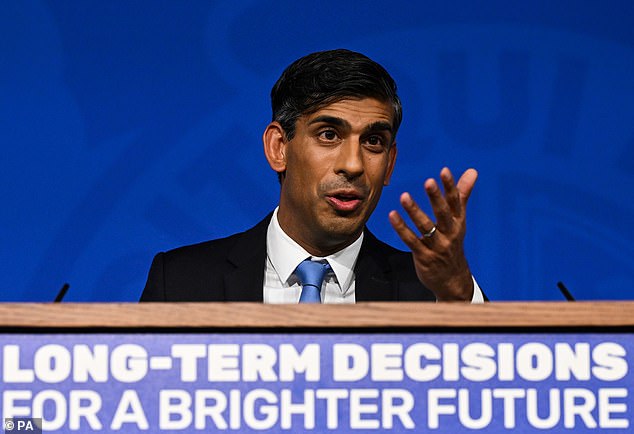Government u-turn on proposed EPC rules for rental homes: What does it mean for landlords and tenants?
The government this week scrapped plans aimed at forcing landlords to improve the energy efficiency of their properties.
On Wednesday, Rishi Sunak announced that the government would ‘soften’ several green policies, including minimum EPC standards for rental properties.
Although it has not yet officially become law, landlords have feared for years that these plans would force them to upgrade their rental properties to achieve an EPC rating of C by 2028.
Potential new EPC requirements scrapped: There were fears that landlords would have to upgrade their properties to an EPC rating of C by 2028 to be able to rent them out
The EPC is a rating scheme that ranks properties between A and G, with an A rating being the most energy efficient and G the least efficient.
Currently, all rental properties in England and Wales must have an EPC of at least E to be let, unless they are exempt.
It now looks like this will remain the rule for the foreseeable future, thanks to the government’s U-turn earlier this week.
Sunak partly justified the abolition of the policy by suggesting that the huge costs of upgrading homes would likely be passed on to tenants in the form of higher rents.
While some government funding will be offered to landlords to upgrade their properties, they will no longer have to fear a fine for not renovating their properties.
The potential requirement to have an EPC of C in order to rent out a home has been on the minds of landlords for some time. It was even seen as a major reason for some landlords to sell up and leave the sector.

The Prime Minister hosted a press conference on Wednesday and confirmed that the government will not force landlords to improve the energy efficiency of their properties by 2028.
Ben Beadle, chief executive of the National Residential Landlords Association, welcomed the news, which he said provides much-needed clarity.
He said: ‘The uncertainty surrounding energy efficiency policies has caused enormous damage to the supply of rental properties.
‘Landlords have difficulty making investment decisions without a clear picture of the government’s direction.
‘It is welcome that landlords will not be required to invest substantial sums of money during a cost of living crisis, when many are themselves in financial difficulty.
‘However, ministers must use the space they create to develop a full plan that supports the rental market to deliver the energy efficiency improvements we all want to see.
“This must include appropriate financial support and a reform of the tax system, which is currently failing to support investments in energy efficiency measures.”
However, not everyone is happy with this particular change in government policy.
Dawid Baranowski of real estate technology company IMMO believes that the impact of EPC regulation on the housing market is a crucial factor in ensuring sustainable and affordable living in the future.
He said: ‘Minimum energy standards, while essential to achieving the Paris targets and the UK’s Net Zero Strategy, are also a beacon of hope for consumers, reducing costs and helping to decarbonise real estate.
‘The fact that the government is making a U-turn on these standards, which have been in the public domain for years, is disheartening as the burden of such a decision falls on the shoulders of tenants, who are often not landowners and the burden of higher authorities. utility bills, especially at a time when we are grappling with a cost of living crisis.
‘More than 2.4 million private rental properties in England will experience higher energy bills, resulting in tenants facing costs of £1.4 billion.’

Ben Beadle, chief executive of the National Residential Landlords Association, welcomed the news, which he said provides much-needed clarity for the sector.
Dan Wilson Craw, deputy director of Generation Rent, also complained about what he described as a colossal mistake by the government.
He adds: ‘Disregarding the impact on the climate will make living costs worse and damage tenants’ health.
‘One in four private renters live in fuel poverty and without targets for landlords to improve their properties, they face many more years of unaffordable bills.
‘Energy efficiency is also an essential part of the quality of a home. Looking back, the government’s leveling mission to halve the number of non-decent rental properties is in tatters.
‘Both tenants and landlords need support to upgrade private rental properties, and the Prime Minister acknowledged that ‘major government grants’ will help make them affordable. But without higher standards, landlords have no incentive to accept tenants’ requests for improvements.”
Some links in this article may be affiliate links. If you click on it, we may earn a small commission. That helps us fund This Is Money and keep it free to use. We do not write articles to promote products. We do not allow a commercial relationship to compromise our editorial independence.

